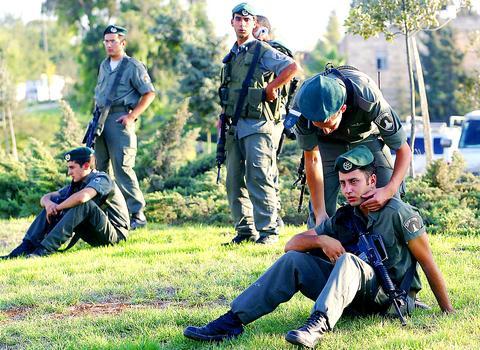Two Israeli policemen died preventing a female suicide bomber from entering a packed Jerusalem bus shelter on Wednesday, probably saving many other lives.
The 19-year-old Palestinian woman detonated the bomb when the policeman demanded to search a bag the authorities say contained about 5kg of explosive.

PHOTO: NY TIMES
"She threw her head back and then there was an explosion," witness Debbie Segal told Army radio. "A few seconds later, her body burst into flames."
Another witness, Binyamin Miller, said: "I thought there must be many people dead because the explosion seemed so loud and then the screaming started. A lot of people were very, very lucky today."
About 20 people were wounded, including a nine year-old boy.
The Al-Aqsa martyrs brigades named the bomber as Zainab Abu Salem from a Nablus refugee camp.
Jerusalem's police chief, Ilan Franco, said that the policemen had prevented many more deaths inside the bus shelter, where more than 20 people were waiting, or would have occurred had she boarded a rush-hour bus.
"The operation of border police officers today in Jerusalem ... prevented a very big attack," he said.
Israel was braced for an attack to coincide with last week's Jewish new year and Yom Kippur tomorrow. The bombing took place in French Hill, a mostly Jewish suburb of occupied East Jerusalem, which has been a favored target for suicide bombings over the past four years of intifada.
Prime Minister Ariel Sharon said Israel would hit back at the Palestinians with "all force."
"In many cases we prevent heavy disasters. Sometimes things happen like what happened today. But we intend to continue our struggle against terror with all force," he added.
Jerusalem Mayor Uri Lupolianski led calls for the speeding up of the construction of the Israel's barrier through the West Bank and East Jerusalem.

PARLIAMENT CHAOS: Police forcibly removed Brazilian Deputy Glauber Braga after he called the legislation part of a ‘coup offensive’ and occupied the speaker’s chair Brazil’s lower house of Congress early yesterday approved a bill that could slash former Brazilian president Jair Bolsonaro’s prison sentence for plotting a coup, after efforts by a lawmaker to disrupt the proceedings sparked chaos in parliament. Bolsonaro has been serving a 27-year term since last month after his conviction for a scheme to stop Brazilian President Luiz Inacio Lula da Silva from taking office after the 2022 election. Lawmakers had been discussing a bill that would significantly reduce sentences for several crimes, including attempting a coup d’etat — opening up the prospect that Bolsonaro, 70, could have his sentence cut to

China yesterday held a low-key memorial ceremony for the 1937 Nanjing Massacre, with Chinese President Xi Jinping (習近平) not attending, despite a diplomatic crisis between Beijing and Tokyo over Taiwan. Beijing has raged at Tokyo since Japanese Prime Minister Sanae Takaichi last month said that a hypothetical Chinese attack on Taiwan could trigger a military response from Japan. China and Japan have long sparred over their painful history. China consistently reminds its people of the 1937 Nanjing Massacre, in which it says Japanese troops killed 300,000 people in what was then its capital. A post-World War II Allied tribunal put the death toll

‘UNWAVERING ALLIANCE’: The US Department of State said that China’s actions during military drills with Russia were not conducive to regional peace and stability The US on Tuesday criticized China over alleged radar deployments against Japanese military aircraft during a training exercise last week, while Tokyo and Seoul yesterday scrambled jets after Chinese and Russian military aircraft conducted joint patrols near the two countries. The incidents came after Japanese Prime Minister Sanae Takaichi triggered a dispute with Beijing last month with her remarks on how Tokyo might react to a hypothetical Chinese attack on Taiwan. “China’s actions are not conducive to regional peace and stability,” a US Department of State spokesperson said late on Tuesday, referring to the radar incident. “The US-Japan alliance is stronger and more

FALLEN: The nine soldiers who were killed while carrying out combat and engineering tasks in Russia were given the title of Hero of the Democratic People’s Republic of Korea North Korean leader Kim Jong-un attended a welcoming ceremony for an army engineering unit that had returned home after carrying out duties in Russia, North Korean state media KCNA reported on Saturday. In a speech carried by KCNA, Kim praised officers and soldiers of the 528th Regiment of Engineers of the Korean People’s Army (KPA) for “heroic” conduct and “mass heroism” in fulfilling orders issued by the ruling Workers’ Party of Korea during a 120-day overseas deployment. Video footage released by North Korea showed uniformed soldiers disembarking from an aircraft, Kim hugging a soldier seated in a wheelchair, and soldiers and officials